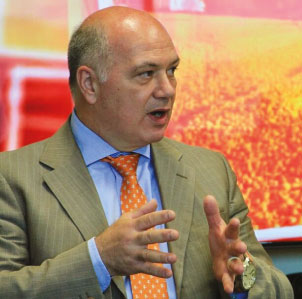GRUPO ATLÁNTIDA LEADS THE HONDURAN INNOVATION SECTOR

By: Jorge Carpio Arrivillaga
Director of the Central American Newspaper Currency
JCA: Inversiones Atlántida has announced its successful issuance for US $ 150 million, listed on the Singapore Stock Exchange, as the the first issuance made by a private company in Honduras, what do you think about it?
G. Valentini: The issuance made by Inversiones Atlántida sets an example for the private and the financial sector of Honduras. As we all know, the main actor that has the power to change the Honduran economy is the private sector, and we are very happy that the financial sector, through Inversiones Atlántida, has made this issuance, which grants Honduras great confidence.
JCA: As a representative of the World Bank in Honduras, aware of the country's macroeconomic situation, do you believe the income of these US $ 150 million will contribute to improve the different macroeconomic indexes of Honduras?
G. Valentini: It is a little complex to define how the macroeconomic indexes are going to change, because it is a moderate bond issuance transaction in worldwide terms; however, it can represent a very strong leverage in the GDP, due to more productive investments.
The country's financial stability will be reflected through the investment in bond issuances, where foreign investment banks will look at the private sector and the financial sector in Honduras in a different way and where, clearly, we see the need for international investors to partner up with local banks. This must have a very favorable impact in the coming years.
JCA: According to a report prepared by the World Bank, the Honduran banking sector is well-capitalized and very profitable. Could you expand on this?
G. Valentini: The banking sector in Honduras is fine, and the issue we oversee is the access to financing for the modernization of the private sector. The Latin American region is characterized by the lack of innovation. The use of foreign capital in the past two decades was not as profitable and productive as it was in Asia. Therefore, we see that the financial sector of Honduras could emulate this capitalization, propitiating a modernization of the private manufacturing and agricultural sector where improvement is needed in the automation processes. If Honduras aims to grow in a global economy where markets are more flexible, it needs the Honduran financial sector to be able to support the industry in order to carry out this reconversion, since many of the industries have a strong need to be modernized.
JCA: Recently, Banco Mundial and Banco Atlántida initiated a partnership, in a very important event in order to be able to establish a new economic sector in Honduras, the technological and innovation sector. Could you expand on this?
G. Valentini: Banco Atlántida took the innovation lead in Honduras with the Honduras Digital Challenge, a recently held event, that seeks to establish a new economic sector in Honduras, the technology and innovation sector. I have seen Guillermo Bueso, as a person who sees a different future for his country, and for Central America, but not only sees it, he also believes it. The visit we made together to Silicon Valley, showed his interest of changing the Honduran economy’s face and to integrate it with global markets.
JCA: Economic integration is one of the ways to promote greater economic growth and achieve a better life quality for Central American people. What do you think of the regionalization process that financial institutions such as Grupo Atlántida have undertaken, with the acquisition of AFP Confía in El Salvador?
G. Valentini: It is extremely important for us. We see, in Grupo Atlántida, actions that are essential for a Central American integration. This region, if united, is of a similar size to Spain, with a population like the Spanish as well. Such a market is more attractive, for competition, for industry, for trade, and to promote a much more competitive industry. However, this integration is also needed to maximize the energy efficiency, employment, and the industry. Clearly, the sector that could help to feed this integration is the financial one.
JCA: As the current G16 Coordinator, what is your impression of Banco Atlántida, the flagship company of Inversiones Atlántida, in Honduras?
G. Valentini: It’s always a pleasure to work with Grupo Atlántida. I know Guillermo Bueso, its CEO, as an innovative person who is open to new knowledge. Certainly, it is easier to adapt to the status quo because if everything works, why change it?
The global financial sector is changing, banks are not the banks of the past. Technological innovation could integrate the financial sector with other Central American countries, just as Atlántida is doing with El Salvador, but also at a global level, we need to think locally, with local productivity, adapting to the changes and the opportunities offered by the worldwide markets.